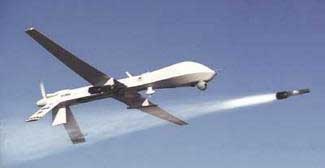by William J. Astore, Antiwar.com.
The business of America is weapons sales. That much is true when you consider the following snippet today from FP: Foreign Policy:
Drone sales. The United States is looking to make changes to a major international arms control treaty that would open the door for wider exports of military drones, Defense News reports. The proposed change to the Missile Technology Control Regime would make it easier for nations to sell drones.
Proliferation of drones: What could go wrong?
America is the world’s leader in drone technology, and the companies that have developed them see even bigger profits on the horizon if they can sell them to America’s allies around the globe. The nature of drones is that they make killing easier — usually bloodless — for those countries that possess the technology. They promise results, but the American use of drones in places like Iraq and Afghanistan has not led to any resolution of those conflicts. Only the body count has increased.
As I wrote in 2012:
A famous utterance attributed to General Robert E. Lee during the U.S. Civil War is, “It is well that war is so terrible – lest we should grow too fond of it.” His words capture the idea that war is an elemental thing – and also a seductive one. Much like a storm-tossed ocean, war is relentless, implacable, and unsparing. It is chaotic, arbitrary, and deadly. It is not to be bargained with; only to be endured.
Given its ferocity, its rapacity, the enormity of its waste and devastation, war is best to be avoided, especially since war itself has its appeals, especially since war itself can be intoxicating, as the quotation from Lee suggests, and as the title of Anthony Loyd’s fine book on the war in Bosnia, My War Gone By, I Miss It So (1999), indicates.
What happens when we decouple war’s terrible nature from its intoxicating force? What happens when one side can kill with impunity in complete safety? Lee’s words suggest that a nation that decouples war from its terrors will likely grow too fond of it. The temptation to use deadly force will no longer be restrained by knowledge of the horrors unleashed by the same.
Such thoughts darken the reality of America’s growing fondness for drone warfare. Our land-based drone pilots patrol the skies of foreign lands like Afghanistan in complete safety. They unleash appropriately named Hellfire missiles to smite our enemies. The pilots see a video feed of the carnage they inflict; the American people see and experience nothing. In rare cases when ordinary Americans see drone footage on television, what they witness is something akin to a “Call of Duty” video game combined with a snuff film. War porn, if you will.
Many Americans seem happy that we can smite foreign “militants” at no risk to ourselves. They trust that our military (and the CIA) rarely misidentifies a terrorist, and that “collateral damage,” that mind-numbing euphemism that obscures the reality of innocent men, women, and children obliterated by missiles, is the regrettable price of keeping America safe.
But the reality is that sloppy intelligence and the fog and friction of war combine to make seemingly antiseptic drone warfare much like all other forms of war: bloody, wasteful, and terrible. Terrible, that is, for those on the receiving end of American firepower. Not terrible for us.
There is a real danger that today’s drone warfare has become the equivalent to the Dark Side of the Force as described by Yoda in The Empire Strikes Back: a quicker, easier, more seductive form of terror. It is indeed seductive to deploy the technological equivalent of Darth Vader’s throat-constricting powers at a safe distance. We may even applaud ourselves for our prowess while doing so. We tell ourselves that we are killing only the bad people, and that the few innocents caught in the crosshairs constitute an accidental but nonetheless unavoidable price of keeping America safe.
In light of America’s growing affection for drone warfare combined with a disassociation from its terrible results, I submit to you a modified version of General Lee’s sentiment:
It is not well that war grows less terrible for us – for we are growing much too fond of it.
William J. Astore is a retired lieutenant colonel (USAF). He taught history for fifteen years at military and civilian schools and blogs at Bracing Views. He can be reached at wastore@pct.edu. Reprinted from Bracing Views with the author’s permission.









